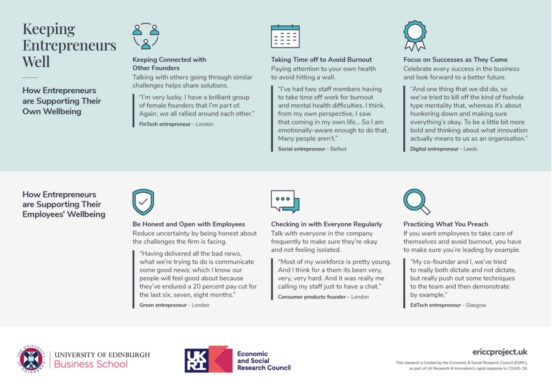This blog post was originally published on the website of ERICC Project (Entrepreneurial Resiliency, Innovation, and Change during the COVID-19 Crisis). Ben Spigel is an Associate Professor in Entrepreneurship and Chancellor’s Fellow at the University of Edinburgh Business School.
Today the ERICC project is pleased to release our first report: Maintaining Wellbeing in a Pandemic — A Guide for Scale-Up Entrepreneurs. Drawing on over 130 interviews with high-growth entrepreneurs across the UK, we look at how the disruption and uncertainty of the pandemic are affecting the mental wellbeing of entrepreneurs and their employees.
You can download a copy of the report here, but below we’ll talk a bit more in-depth about the wellbeing crisis facing British entrepreneurs as well as several techniques entrepreneurs can use to support their own wellbeing and the wellbeing of their employees.
First, what is wellbeing and why does it matter? Wellbeing is a person’s mental and physical wellness, representing their ability to successfully engage with their work and personal activities. Workers with poor wellbeing are less productive and more likely to leave the company. For entrepreneurs, wellbeing is critical to their ability to lead a company and react to the challenges of growing their firm during the pandemic. Poor wellbeing will reduce creativity and resilience and can ultimately lead to burnout.
This makes poor wellbeing a major issue facing the British entrepreneurial ecosystem. While there has been substantial government support for the financial health of businesses across the country, much less attention has been paid to the mental health of high-growth entrepreneurs. There is a major risk of losing an entire generation of high-growth entrepreneurs to permanent burnout.
It’s almost too obvious to say that the pandemic is having a major negative impact on the wellbeing of high-growth entrepreneurs and their workers. There have been numerous news stories and studies of the emotional impacts of working from home under a cloud of health and economic uncertainty.
From our interviews, we saw that one of the biggest ways that entrepreneurs’ wellbeing was impacted by the Covid-19 pandemic was their emotional attachment to their employees. As one entrepreneur told us:
We have a workforce of about 25 people. Just for me, it’s like knowing that 25 people depend on me to provide the money for their children. And it’s an amazing thing, but also a lot of responsibility.
Founders had to take on new roles over the past 9 months, including confidant, therapist, and priest. Both by choice and by necessity, they are providing more emotional support to their employees to support them during this time. Those that had to furlough or make employees redundant over the pandemic said that this was almost emotionally traumatic and had a deep impact on them.
From our interviews, we identified several key coping strategies entrepreneurs can use to maintain their wellbeing and their employees’ without overwhelming themselves. This infographic shows a few of these techniques and the experiences of entrepreneurs who used them.
One of the most important things we can do to support the wellbeing of entrepreneurs during this crisis is simply to talk about the problem. Unlike economic support for entrepreneurs, governments have fewer obvious options to support entrepreneurial wellbeing. But highlighting and discussing the issue and encouraging entrepreneurs to talk with each other about the challenges they’re facing, is an important first step to ensuring that entrepreneurs aren’t burnt out by this long and ever-evolving crisis.





Comments by Hashemi